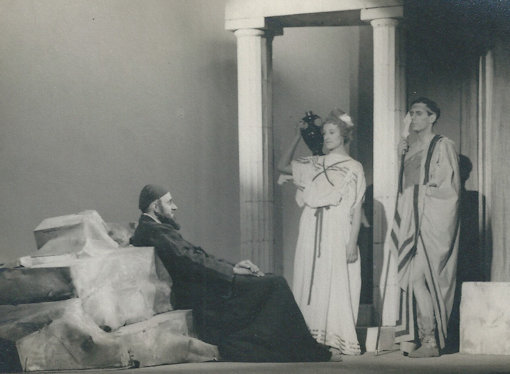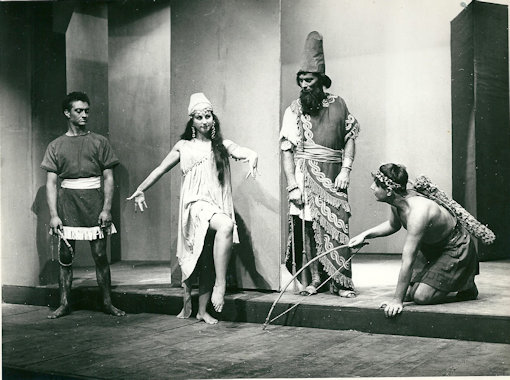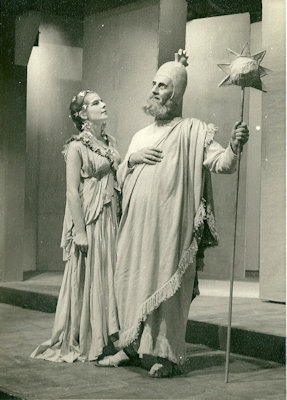|
We sadly learnt of the death of Michael Kelly in July of this year (2003). Michael was a formative figure in our history and played a key role in the development of The Questors' reputation for encouraging and
performing new work. His wife Diana recalls: "Most of our happy memories of The Questors are of the
period before, during and a few years after the war; hence mostly of the old theatre in the church hall
(The Old Tin Hut). So many of his plays were staged there. Some were rewritten as radio scripts for
the BBC."
 Michael Kelly's Icarus Preserved (1941) was the first production of a full-length new play written specially for the company. The seeds of The Questors' interest in producing and commissioning new plays had been sown as early as 1933 with the first Annual Drama Festival. These Festivals gave
acting members the opportunity to mount their own short, small-cast productions. Michael Kelly, who Michael Kelly's Icarus Preserved (1941) was the first production of a full-length new play written specially for the company. The seeds of The Questors' interest in producing and commissioning new plays had been sown as early as 1933 with the first Annual Drama Festival. These Festivals gave
acting members the opportunity to mount their own short, small-cast productions. Michael Kelly, who
had joined The Questors to work on lighting and who was by this time Lighting Manager, began his writing career with such one-act plays. It was the success of that wartime performance of Icarus
Preserved and other new plays (of Michael Kelly's and other authors) that were put on during the
following five or six years, which led to the policy of choosing at least one new play every season and ultimately to The Questors' continuing reputation for encouraging new play writing.
Throughout the 1950s, as plans for building our own theatre developed and energies were focussed
so much on fund-raising, The Questors never lost sight of its commitment to experiment, not just with stage  form but with design, technical aspects, lights, sound and styles of production, and Michael was very much a part of this movement. His play Gilgamesh (1956), directed by Colette King and designed by Norman Branson (the architect of The Questors Playhouse), reflected and utilised many of the concepts that were guiding the design of the new theatre. Scene changes were effected by the use of mobile periaktoi (or prisms), each powered by a concealed stage hand who, torch in hand, followed a course marked by lines on the stage to achieve a series of abstract arrangements, the movements choreographed to coincide with the thematic development. form but with design, technical aspects, lights, sound and styles of production, and Michael was very much a part of this movement. His play Gilgamesh (1956), directed by Colette King and designed by Norman Branson (the architect of The Questors Playhouse), reflected and utilised many of the concepts that were guiding the design of the new theatre. Scene changes were effected by the use of mobile periaktoi (or prisms), each powered by a concealed stage hand who, torch in hand, followed a course marked by lines on the stage to achieve a series of abstract arrangements, the movements choreographed to coincide with the thematic development.
As so often at that time, The Questors was mirroring experiments going on elsewhere; mobile scenery was being used, for example, in the Shakespeare Memorial Theatre's King Lear with John Gielgud.
 Alfred Emmet wrote about Gilgamesh: Alfred Emmet wrote about Gilgamesh:
"There is no doubt that it was the most adventurous production at The Questors for many a day. Moreover it has taken us a considerable step forward in our progress towards the new theatrical forms which we must develop and exploit in our new theatre.
"In the actual writing Michael Kelly was able to experiment with some of the possibilities opened to the writer by such a method of presentation — freedom from time and place, a swift flow, interesting and intricate patterns of dialogue, great directness, a concentration of thought and emotion, and a strong
theatricality. The imaginative effect was often intense and great beauty was achieved.
"Michael Kelly, Colette King, the director, and Norman Branson have built a landmark in The Questors' history at least as important and far-reaching as when Eric Voce first brought a naturalistic play (The Doll's
House 1945) out on to the fore-stage."
[Questopics 491, September 2003]
PLAYS BY MICHAEL KELLY PERFORMED AT THE QUESTORS
1940 Only Got Egg
1941 Bristol Hotel
1941 Fool's Mate
1941 Icarus Preserved
1942 The Raft
1943 The Alchemist
1944 Sea Flood
1945 The Ferry
1946 The Patriot
1947 Cranford (adaptation)
1947 Final Dividend
1947 Only Got Egg
1948 The Tuscan Artist
1953 Monsieur Bon-Bon
1956 Gilgamesh
1956 The Morro (rehearsed reading)
1989 The Galileo Case (rehearsed reading)
|
